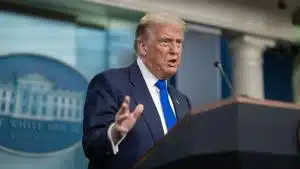(The Center Square) – The “big beautiful bill” passed by Congress and signed into law by President Donald Trump allocates an historic nearly $25 billion to strengthen the U.S. Coast Guard. The largest single funding commitment in Coast Guard history comes ahead of its 235th birthday.
The Coast Guard was founded on Aug. 4, 1790, after President George Washington signed the Tariff Act into law authorizing the construction of 10 vessels to enforce federal tariff and trade laws. It first operated as the Treasury Department’s U.S. Revenue Cutter Service and was renamed in 1915. It currently operates under the U.S. Department of Homeland Security.
Coast Guard crew have been integral to maritime interdiction efforts under the Biden and Trump administrations, The Center Square reported. Last week, a single USCG helicopter crew rescued a record 165 people during the historic Hill Country, Texas, floods, The Center Square reported.
The nearly $25 billion investment strengthens every aspect of USCG operations to continue its role as the leading maritime drug interdiction and border security force.
Funding will enable the USCG to procure an estimated 17 new icebreakers, 21 new cutters, over 40 helicopters and six C-130J aircraft and modernize its shore infrastructure and maritime surveillance systems. It will also strengthen its ability to interdict maritime illegal border crossers and traffickers, strengthen search and rescue operations and enhance navigational safety and enable maritime trade, it says.
“This historic investment marks a new era for the Coast Guard,” Coast Guard Acting Commandant Adm. Kevin Lunday said. “It reflects the strong support of the American people and empowers us to restore our Service and prepare for the challenges of today and tomorrow. With this level of support, and the dedication of our Coast Guard men and women, there’s nothing we can’t accomplish. We are deeply grateful for this opportunity to build a stronger Coast Guard for the Nation.”
Key investments include:
- $4.4 billion for shore infrastructure, training facilities and homeports;
- $4.3 billion for Polar Security Cutters, extending U.S. reach in the Arctic;
- $4.3 billion for nine new Offshore Patrol Cutters;
- $3.5 billion for three Arctic Security Cutters;
- $2.3 billion for more than 40 MH-60 helicopters;
- $2.2 billion for depot level maintenance to sustain readiness;
- $1.1 billion for six new HC-130J aircraft and simulators;
- $1 billion for Fast Response Cutters;
- $816 million for light and medium Icebreaking Cutters;
- $266 million for long-range unmanned aircraft systems;
- $170 million for maritime domain awareness, including next-generation sensors;
- $162 million for three Waterways Commerce Cutters.
The investment will support the USCG Force Design 2028 plan to modernize operations and bolster USCG capabilities.
The Coast Guard “extends its appreciation for the leadership” of Trump and his administration and members of Congress “for recognizing the strategic importance of a ready, modern and resilient Coast Guard.”
U.S. Coast Guard crew patrol more than 95,000 miles of shoreline, 25,000 miles of navigable rivers and 4.5 million square miles of U.S. exclusive economic zone. More than 55,000 members operate an interoperable fleet of more than 250 cutters, 200 fixed and rotary-wing aircraft, 1,600 boats and a dedicated cyber command.
“We save lives. We protect the environment. We defend the homeland. We enforce Federal laws on the high seas, the nation’s coastal waters and its inland waterways. We are unique in the Nation and the world,” the Coast Guard says.


















































